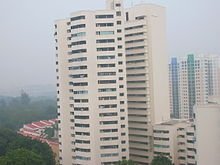Singapore Environmental Issues
Environment - current issues: industrial pollution; limited natural freshwater resources; limited land availability presents waste disposal problems; seasonal smoke/haze resulting from forest fires in Indonesia
Definition: This entry lists the most pressing and important environmental problems. The following terms and abbreviations are used throughout the entry:
Acidification - the lowering of soil and water pH due to acid precipitation and deposition usually through precipitation; this process disrupts ecosystem nutrient flows and may kill freshwater fish and plants dependent on more neutral or alkaline conditions (see acid rain).
Acid rain - characterized as containing harmful levels of sulfur dioxide or nitrogen oxide; acid rain is damaging and potentially deadly to the earth's fragile ecosystems; acidity is measured using the pH scale where 7 is neutral, values greater than 7 are considered alkaline, and values below 5.6 are considered acid precipitation; note - a pH of 2.4 (the acidity of vinegar) has been measured in rainfall in New England.
Aerosol - a collection of airborne particles dispersed in a gas, smoke, or fog.
Afforestation - converting a bare or agricultural space by planting trees and plants; reforestation involves replanting trees on areas that have been cut or destroyed by fire.
Asbestos - a naturally occurring soft fibrous mineral commonly used in fireproofing materials and considered to be highly carcinogenic in particulate form.
Biodiversity - also biological diversity; the relative number of species, diverse in form and function, at the genetic, organism, community, and ecosystem level; loss of biodiversity reduces an ecosystem's ability to recover from natural or man-induced disruption.
Bio-indicators - a plant or animal species whose presence, abundance, and health reveal the general condition of its habitat.
Biomass - the total weight or volume of living matter in a given area or volume.
Carbon cycle - the term used to describe the exchange of carbon (in various forms, e.g., as carbon dioxide) between the atmosphere, ocean, terrestrial biosphere, and geological deposits.
Catchments - assemblages used to capture and retain rainwater and runoff; an important water management technique in areas with limited freshwater resources, such as Gibraltar.
DDT (dichloro-diphenyl-trichloro-ethane) - a colorless, odorless insecticide that has toxic effects on most animals; the use of DDT was banned in the US in 1972.
Defoliants - chemicals which cause plants to lose their leaves artificially; often used in agricultural practices for weed control, and may have detrimental impacts on human and ecosystem health.
Deforestation - the destruction of vast areas of forest (e.g., unsustainable forestry practices, agricultural and range land clearing, and the over exploitation of wood products for use as fuel) without planting new growth.
Desertification - the spread of desert-like conditions in arid or semi-arid areas, due to overgrazing, loss of agriculturally productive soils, or climate change.
Dredging - the practice of deepening an existing waterway; also, a technique used for collecting bottom-dwelling marine organisms (e.g., shellfish) or harvesting coral, often causing significant destruction of reef and ocean-floor ecosystems.
Drift-net fishing - done with a net, miles in extent, that is generally anchored to a boat and left to float with the tide; often results in an over harvesting and waste of large populations of non-commercial marine species (by-catch) by its effect of "sweeping the ocean clean."
Ecosystems - ecological units comprised of complex communities of organisms and their specific environments.
Effluents - waste materials, such as smoke, sewage, or industrial waste which are released into the environment, subsequently polluting it.
Endangered species - a species that is threatened with extinction either by direct hunting or habitat destruction.
Freshwater - water with very low soluble mineral content; sources include lakes, streams, rivers, glaciers, and underground aquifers.
Greenhouse gas - a gas that "traps" infrared radiation in the lower atmosphere causing surface warming; water vapor, carbon dioxide, nitrous oxide, methane, hydrofluorocarbons, and ozone are the primary greenhouse gases in the Earth's atmosphere.
Groundwater - water sources found below the surface of the earth often in naturally occurring reservoirs in permeable rock strata; the source for wells and natural springs.
Highlands Water Project - a series of dams constructed jointly by Lesotho and South Africa to redirect Lesotho's abundant water supply into a rapidly growing area in South Africa; while it is the largest infrastructure project in southern Africa, it is also the most costly and controversial; objections to the project include claims that it forces people from their homes, submerges farmlands, and squanders economic resources.










